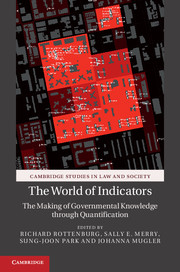Book contents
- Frontmatter
- Contents
- List of figures
- List of tables
- List of abbreviations
- List of contributors
- 1 A world of indicators: The making of governmental knowledge through quantification
- 2 The flight of the indicator
- 3 Narrating numbers
- 4 By their own account: (Quantitative) Accountability, Numerical Reflexivity and the National Prosecuting Authority in South Africa
- 5 Failure by the numbers? Settlement statistics as indicators of state performance in South African land restitution
- 6 Doing the transparent state: Open government data as performance indicators
- 7 Charting the road to eradication: Health facility data and malaria indicator generation in rural Tanzania
- 8 ‘Nobody is going to die’: An ethnography of hope, indicators and improvizations in HIV treatment programmes in Uganda
- 9 Financial indicators and the global financial crash
- 10 New global visions of microfinance: The construction of markets from indicators
- 11 Spirits of neoliberalism: ‘Competitiveness’ and ‘wellbeing’ indicators as rival orders of worth
- 12 Climate change vulnerability indicators: from noise to signal
- 13 Retroaction: how indicators feed back onto quantified actors
- Index
- Cambridge Studies in Law and Society
- References
3 - Narrating numbers
Published online by Cambridge University Press: 05 October 2015
- Frontmatter
- Contents
- List of figures
- List of tables
- List of abbreviations
- List of contributors
- 1 A world of indicators: The making of governmental knowledge through quantification
- 2 The flight of the indicator
- 3 Narrating numbers
- 4 By their own account: (Quantitative) Accountability, Numerical Reflexivity and the National Prosecuting Authority in South Africa
- 5 Failure by the numbers? Settlement statistics as indicators of state performance in South African land restitution
- 6 Doing the transparent state: Open government data as performance indicators
- 7 Charting the road to eradication: Health facility data and malaria indicator generation in rural Tanzania
- 8 ‘Nobody is going to die’: An ethnography of hope, indicators and improvizations in HIV treatment programmes in Uganda
- 9 Financial indicators and the global financial crash
- 10 New global visions of microfinance: The construction of markets from indicators
- 11 Spirits of neoliberalism: ‘Competitiveness’ and ‘wellbeing’ indicators as rival orders of worth
- 12 Climate change vulnerability indicators: from noise to signal
- 13 Retroaction: how indicators feed back onto quantified actors
- Index
- Cambridge Studies in Law and Society
- References
Summary
Introduction
This chapter examines one aspect of the logic that characterizes many indicators: the dynamic relationship between simplification and elaboration that is behind the production, circulation and interpretation of indicators. Indicators are appealing partly because they simplify complex organizations and processes in order to produce public, authoritative knowledge that makes them appear legible to outsiders. This simplification takes many forms but one way to characterize it is to understand it as the erasure of narratives: the systematic removal of the persons, places and trajectories of the people being evaluated by the indicator and the people doing the evaluation. This stripping away of narrative facilitates the circulation and insertion of numbers in new locations and their adaptability to new contexts. But as these new forms of knowledge move about and are re-appropriated or resisted by those being evaluated, they elicit new narratives, new stories about what they mean, how they unfold, if they are fair or unfair, or who made them and why. These narratives are important to analyse because they help us understand how actors make sense of their worlds, which is crucial for understanding the impact of quantification. Relying primarily on the examples of educational rankings, I consider this interplay between the erasure and invocation of narratives for different audiences in the production and reception of indicators.
An essay on narrative ought to start with a story. It is April, five or so years ago, and the Dean of a large, prestigious West Coast law school is dreading the ‘town-hall meeting’ he has felt compelled to schedule. He was expecting scores of unhappy students well-schooled in the art of argument to attend. The reason the Dean called this meeting is that the US News and World Report (USN), an American news magazine, had just released its annual ranking of graduate schools, including US law schools. The school's rank had just dropped two notches. His job at the meeting would be to explain why and try to reassure the students that theirs was still an elite school and that their careers were not jeopardized because of this decline in rank.
Law students are an articulate and anxious bunch, especially after the economic crisis shrivelled the market for attorneys; but even so students’ reactions to the small drop in rankings at this school seem extreme, at first blush.
- Type
- Chapter
- Information
- The World of IndicatorsThe Making of Governmental Knowledge through Quantification, pp. 56 - 75Publisher: Cambridge University PressPrint publication year: 2015
References
- 51
- Cited by



